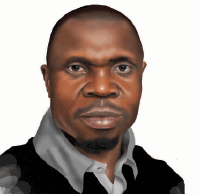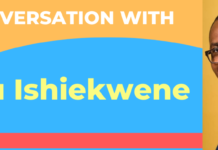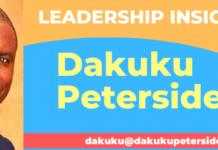The countdown has started. Weeks have turned to days and days are turning to hours; just a few hours. Time no longer walks; it flies, bringing closer the day of reckoning. It is also a day of joy and sorrow; a day of tears and sweat; as Winston Churchill would say.
Very soon, the tension will thaw, giving rise to reality. Some will laugh. Others will cry. While some will sigh and blame the outcome on the devil called rigging; others will rejoice and testify of the finger of God.
There are two sides to every competition: winning and losing. Unfortunately, in Nigerian politics, there has always been only a winner. Whoever wins is always accused of rigging. No loser ever believes he was defeated. Losers always complained of being robbed of victory.
This same scenario is likely to play out next week when the next president of Nigeria would emerge. He could be Goodluck Jonathan, who may be re-elected to the office, or Muhammadu Buhari, a military dictator-turned democrat who is opposing Jonathan’s re-election bid.
If Jonathan wins, then Buhari would have failed in the effort four clear times. But if Buhari wins, it would be his second coming to power.
One thought keeps coming to mind: Will the General cry again if he loses this time as he did in 2011? Who would ever believe that the mean-looking, tough-talking General, who swept through Nigeria like a hurricane in 1984 and a part of 1985, could cry publicly?
Anytime I watch the hate-video used by the Peoples Democratic Party (PDP) to advertise Buhari as a vow-breaker, I’m filled with unbelief. In that video, Buhari is seen removing his eye-glasses to mop the stream of tears rushing down his face as he announced his decision not to contest for the presidency any longer after he was defeated in 2011.
That tape is meant to counter the one used by the All Progressives Congress (APC) to advance their position that Jonathan does not keep to his words. The tape shows that the president had promised to quit office after four years, but has reneged on the promise.
It is not clear whether the on-going hate campaigns will add any electoral value to the fortunes of the two political parties and their candidates. One thing is, however, clear: whoever emerges president next weekend will simply be riding to power on the misfortunes of the other.
How sweet it would be for the loser to congratulate the winner, instead of heading for the tribunal or calling his supporters out to kill and destroy. Why don’t we build a culture of gallantly accepting defeat in elections? This is the practice in modern democracy.
It would also make a lot of difference for the winner of the election on Saturday to embrace the ideals bandied by the loser during the campaigns; form a government of inclusion; and make good his campaign promises. The victory should be for democracy and not for an individual.
However, my worry lies with lawyers and political godfathers who are not likely to allow this to happen. Lawyers make fortunes from election crisis. They always must convince the candidates or the losers that a case in court is a victory at hand. Most of the candidates see these lying tongues as oracles.
Political godfathers are bad investors. They are directly responsible for most of the corrupt practices in government. They pick candidates for election; whether such candidates are good for the office is not a part of their consideration. They sponsor such candidates with a household of conditions.
A victory for the candidate is a victory for the godfather and his clan. It also means further enrichment of the godfather at public expense because he must not only get back what he invested but must do so with surplus profit. With this in mind, the godfather does everything to ensure the victory of his candidate.
It is actually not easy to be a godfather. It requires more than political connection and money. For instance, anticipating that his political opponents may try to outsmart and defeat his candidate, the godfather must hire killers; train and arm them in readiness for action. What a deadly investment!
Those who have lived long enough in this country will confirm that very few electoral campaigns in Nigeria have been as tension-soaked as that of 2015. People have become so apprehensive that while the rich are heading outside the country with their family members, the poor are returning to their hometowns.
The fear is that there will be war, violence and bloodshed. It is not an unfounded fear. Such things are regular in our recent political history. From Abuja, people are rushing back to their hometowns where they feel more secured.
I met a former colleague the other day; she now works with a federal agency and earns a better pay. I asked whether she had completed her house project in Abuja. She looked at me curiously and asked: “Are you living in Nigeria? I’m saving my money just in case I need to run when riot breaks.”
That’s how bad it is. However, I see peace, not war. This may turn out to be the most peaceful election in Nigeria. The church is praying. We cannot worship a God of peace and be preparing for war. The votes will count. It is only the elects of God that will emerge as winners. Amen.















